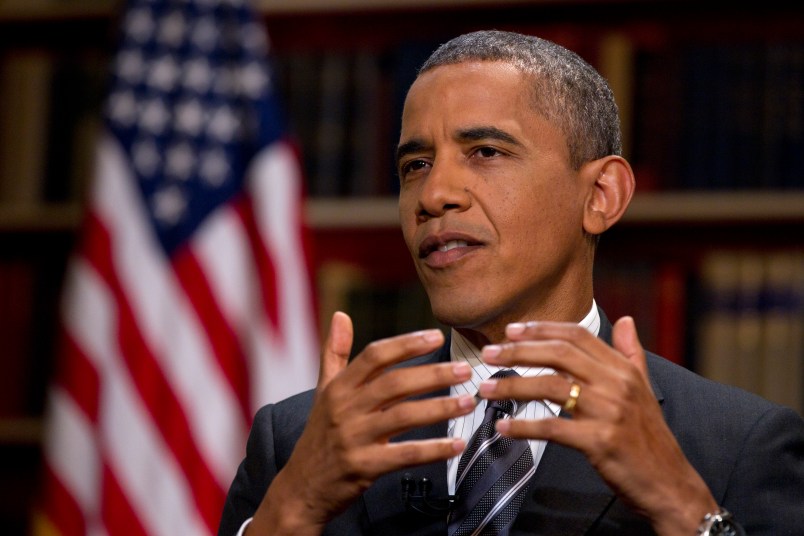Despite recent turmoil over several police killings of unarmed black men by white officers, President Obama told NPR that race relations are better off than before he was elected.
“I actually think that it’s probably in its day-to-day interactions less racially divided,” the President told interviewer Steve Inskeep in an interview published Monday. “But I actually think that the issue has surfaced in a way that probably is healthy.”
Obama argued that the tensions between blacks and police departments across the country were not new. He added that while problems are becoming more visible due to social media and technology, people now have a better chance at raising awareness and making change.
“It’s understandable the polls might say, you know, that race relations have gotten worse — because when it’s in the news and you see something like Ferguson or the Garner case in New York, then it attracts attention,” the President said.
“But I assure you, from the perspective of African-Americans or Latinos in poor communities who have been dealing with this all their lives, they wouldn’t suggest somehow that it’s worse now than it was 10, 15 or 20 years ago,” he added.
When Inskeep asked how the President planned to address these problems in his final two years in office, Obama referenced his time as a state senator in Illinois, passing legislation such as a 2003 racial profiling bill.
“We were able to work with the police departments and the state police in Illinois and persuade them that they would be doing a better job policing if we just kept track so that we had data,” he told NPR.
The President concluded by describing an administration “task force” drawing from police officers, activists and community leaders designed to find solutions to persistent racial tensions across the country.
“[W]hat’s been striking to me in the conversations we’ve had is that they’re interested in solving a problem as opposed to simply stewing in the hopelessness of race relations in this country,” he said. “And I’m convinced that we actually are going to see progress on this issue next year.”







AMerica VOTEd an AfriCAn PREsIDent TwiCE DESPite WANTing KEnyan SociaLISITC utoPIARY. A BLAck SayS WE are POSt RAciaLISTIC TO cONFirM It IS trUE that America IS no lONGer racisT agaiNSt blACK cHICKy cHIcY ChiNEse, anD large-CALVed HISPANIOLIOs!11!!1!!one!11!!!1!.
It’s good that President Obama is staking out the sensible position on this issue, which has the benefit of garnering support from sensible police officers and chiefs and isolating extremists. He has publicly defended the rights of citizens to peacefully protest, but denounced violence.
It was also good to read on this site the letter the Nashville police chief wrote to a local resident who felt the police were too accommodating of protesters - it’s good to read about a law enforcement official who understands his role as a public servant.
For a good overview of Obama’s nuanced perspective on race relations, go back to his April 2008 speech, made in response to the manufactured outrage over remarks made by his former pastor, Rev. Wright. I listened to it a couple of weeks ago, and feel it still rings true.
“But I assure you, from the perspective of African-Americans or Latinos in poor communities who have been dealing with this all their lives, they wouldn’t suggest somehow that it’s worse now than it was 10, 15 or 20 years ago…”
No, it’s just the ones who are unfortunate enough to interact with those whose bigotry has been energized by Fox News and conservative media who can tell it’s gotten worse.
I wouldn’t make the mistake that just because the use of the N-word in mixed company has faded that the ignorance behind it has likewise. If anything, the resentment has been driven underground where it is reaching a boiling point.
“If I say ‘Negro’ or ‘black boy’ or ‘slave,’ if those people cannot take those kind of words and not be [offended], then Martin Luther King hasn’t got his job done yet,"
– America’s hero, sovereign citizen Cliven Bundy
I’ve really enjoyed how race relations became Obama’s issue to address; his “problem” that he’s been asked to resolve. And all the criticism he’s received as to his position on the matter. I don’t remember any of his predecessors being asked to confront race relations or to come up with any “solutions”?
I agree, he certainly has been asked to shoulder a lot because of his race.
However, on this and many issues I am confident that he is a great man to lead us in these trying times. Part of his lasting legacy will be that he attempted to break ground on subjects that many were unwilling to broach, and that he was able to enlist people to the causes that he found important.